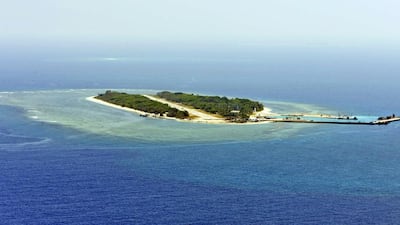China has been expanding its frontiers since 1949. Yet no country dared to haul it before an international tribunal until the Philippines invoked the dispute-settlement mechanism of the United Nations Convention on the Law of the Sea, thereby setting in motion the arbitration proceedings that this week resulted in the stinging rebuke of China’s expansive claims in the South China Sea.
The trigger for Manila approaching the International Tribunal for the Law of the Sea was China’s capture in 2012 of Scarborough Shoal. The matter was then referred to The Hague-based Permanent Court of Arbitration.
Despite strenuous Chinese efforts to dismiss and discredit the proceedings from the start, Beijing tried unsuccessfully to persuade the tribunal that it had no jurisdiction to hear the case. Last October, the tribunal said that the Philippines was within its rights in filing the case, and that China’s non-participation in the proceedings was immaterial.
Now in its final unanimous verdict, the tribunal has dismissed Beijing’s claim that it has historic rights to much of the South China Sea and ruled that China was in violation of international law by causing ecological damage through its island-building spree. The panel effectively declared as illegitimate China’s South China Sea boundary (the so-called nine-dash line).
It also held that China’s strategy of creating artificial islands and claiming sovereignty over them and their surrounding waters had no legal basis. In less than three years, China has built seven islands and militarised several of them in an attempt to annex a crucial corridor through which much of the world’s annual merchant fleet tonnage passes.
In the absence of a mechanism to enforce the ruling, Beijing was quick to pour scorn on the verdict.
Contrast China’s contempt for the landmark verdict with neighbouring India’s ready acceptance of adverse rulings in recent years by PCA tribunals in two separate cases – India’s maritime-boundary dispute with Bangladesh and its Indus River-related dispute with Pakistan over a small dam project at Kishanganga. India deferentially accepted the verdicts and complied with them, although the Kishanganga ruling will affect all future Indian projects on the Indus and the other ruling has left a large “grey area” while delimiting the Bangladesh-India sea borders.
China’s disdain for the ruling shows that international law matters to it only when it can serve its own interests. Otherwise, international rules are bendable and expendable. To be sure, China has never pretended that it believes in a rules-order. This was apparent from its aggressive steps to enforce its sovereignty claims in the South China Sea – actions that the tribunal has now ruled violate international law.
Indeed, Beijing has sought to rely on a multinational proclamation that it has flagrantly breached – the Declaration on the Conduct of Parties in the South China Sea, which it signed with the 10 Asean states in 2002. While violating the declaration’s central commitment to resolve “disputes by peaceful means, without resorting to the threat or use of force”, Beijing has cited the declaration’s reference to the use of “friendly consultations and negotiations by sovereign states directly concerned” to insist that any dispute can only be addressed bilaterally and not through international arbitration or adjudication.
Dispute settlement by peaceful means is essential to building harmonious interstate relations. However, Beijing’s dismissal of the tribunal’s ruling is in keeping with its broader opposition to settling disputes with its neighbours, from Japan and South Korea to India and tiny Bhutan, by means of international mediation, arbitration or adjudication.
Instead, China’s creeping aggression in Asia reflects a “might is right” strategy that aims to extend Chinese control to strategic areas and resources by altering the status quo. The strategy focuses on a steady progression of steps to create new facts on the ground by confounding and outwitting neighbours while avoiding a confrontation with the United States, which sees itself as a geographically non-resident power in Asia.
Through its furious reaction to the tribunal’s ruling, China is saying that it should be the judge in its own cause. More ominously, it is signalling its determination to stay on the present course of unilateralism and settle matters militarily in the South China Sea, which is larger than the Mediterranean.
The example it is setting will not only be damaging to the law of the sea but is also likely to stoke serious tensions and insecurities in Asia, the world’s economic locomotive.
The South China Sea – a global trade and maritime hub – is critical to the contest for influence in the larger Indo-Pacific region extending from the Arabian Sea to Australia and Canada. As China consolidates its power in the South China Sea by completing ports and airstrips and building up its military assets on man-made islands, the effect of its actions will extend beyond reducing Asian states to a tributary status: such consolidation will have a significant bearing on the wider geopolitics, balance of power, and maritime order.
Like-minded states must work closely together to defend the law of the sea by ensuring that defiant unilateralism is not cost-free. Unless China is made to realise that its future lies in cooperation and not confrontation, a systemic risk to Asian stability and prosperity is bound to arise, with far-reaching implications for the world.
Brahma Chellaney is a geostrategist and author


